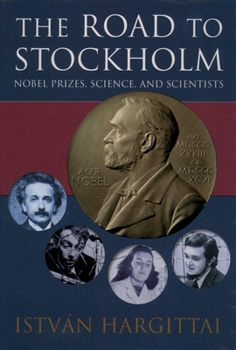The Road to Stockholm: Nobel Prizes, Science, and Scientists
Select Format
Select Condition 
Book Overview
The Nobel Prize is by far the highest recognition a scientist may receive and the only one with which the general public is familiar. Its prestige has reached improbable heights. At the same time a lot of myth surrounds the Nobel Prize, and this is compounded by the fact that people tend to view scientists with some bewilderment.
This book introduces the process of selection of the laureates, discusses the ingredients for scientific discovery...
Format:Hardcover
Language:English
ISBN:019850912X
ISBN13:9780198509127
Release Date:May 2002
Publisher:Oxford University Press, USA
Length:370 Pages
Weight:1.75 lbs.
Dimensions:1.3" x 6.4" x 9.4"
Customer Reviews
2 ratings
"What Singular Prize is only for Three, Two or One?"
Published by Thriftbooks.com User , 17 years ago
"The Road to Stockholm: Nobel Prizes, Science, and Scientists", by Istvan Hargittai, Frwd. James Watson, Oxford Univ. Press, GB 2002/3, ISBN: 0-19-860785-7, PC 344 pages, includes Preface, Acknowledgments, Notes 48 pgs., Nobelists (1901-2002) 28 pgs., & Name Index 10 pgs., plus 59 glossy B & W photographs. 7 7/8" x 5". Hargittai, Professor of Chemistry and Structural Chemist Researcher at Budapest and Eotvos Univs. is extensively published. He's personally acquainted with many Nobelists discussed in this book and was guest lecturer at Royal Swedish Academy of Sciences, Stockholm, 2001 on this book's contents. He discusses establishment of the Nobel Prize(s) in 1895 by Alfred Nobel (1833-'96) and details his Will, it's Statutes, categories, nomination & selection processes, and awards bestowed (medals, money, and ceremonies). The book has focused chapters: -- on biases, who wins, discoveries, adversities, incentives toward science career, venues, mentors, changing fields, making impact, life after a Nobel Prize, and who did not win and why. Of interest are the personal reflections of scientists both upon themselves, their associates and others in allied fields over impact of discoveries to themselves and society. Hargittai writes in interesting, educational and entertaining prose, a style to maintain the reader's interest. He discloses the primal nature of basic research, of asking the appropriate question, finding its answer and publishing results in peer-reviewed publications forthwith. He describes an exciting social subculture, a world-set of the Laureates and near-Laureatres who reflect, often at great length, upon discoveries, failures, impacts and he even renders a mild flirtation with hypotheses of how to achieve a Nobel Prize. Aside from some prolixity which establishes internal consistency, there are dozens of nicely stated maxims one is wont to memorize.
How to win (or not win) the Nobel Prize
Published by Thriftbooks.com User , 22 years ago
Professor István Hargittai, a Hungarian research chemist, has written a beautiful book about the myths and stories surrounding the Nobel Prizes for physics (P), chemistry (C), and medicine or physiology (M). Starting from the somewhat vague Nobel's Will, written in 1895, he goes on to analyze various aspects of the organization of the Nobel Foundation, national politics associated to the assignment of the prize, and the common characteristics of the winners. Many nobelists have carried out scientific experiments during their childhood while others have followed the steps of a great mentor, in some case himself a winner. Surprising for us is the kind of hardships (i.e., persecutions, illnesses, poverty, etc.) that many nobelists have faced during the initial steps of their scientific careers. Perhaps these hardships acted as catalysts in persuing one's goals. Working either in a stimulating and creative environment (for example, the Cavendish Laboratory in Cambridge produced a lot of winners) or in a research field different from that of origin may represent additional ingredients for success. A final (12-th) chapter is dedicated to the non-winners, i.e. top level scientists that didn't receive the prize in spite of their fundamental discoveries and contributions to science. Among them we find the russian chemist Dmitri Mendeleev (Periodic Table of the Elements), the botanist Michael Tsweet (discoverer of chromatography), Oswald Avery (the proposer that DNA, not proteins, is the genetic material), Leo Szilard (physicist and molecular biologist), Arnold Sommerfeld (one of the founders of quantum mechanics), the chemist G.N. Lewis (important contributor to the fields of chemical thermodynamics and the electronic structure of molecules), and Lise Meitner (co-discoverer - with Otto Hahn - of nuclear fission), just to cite some examples. An important name missing here is that of John von Neumann, the Hungarian-born mathematical physichist that, in addition to having been a child prodigy, contributed greatly in the fields of set theory, algebra, quantum mechanics, and computer science. The reader interested in the remaining Nobel Prizes (Literature, Peace, Economics) may complement this book with Burton Feldman's "The Nobel Prize : A History of Genius, Controversy and Prestige".





